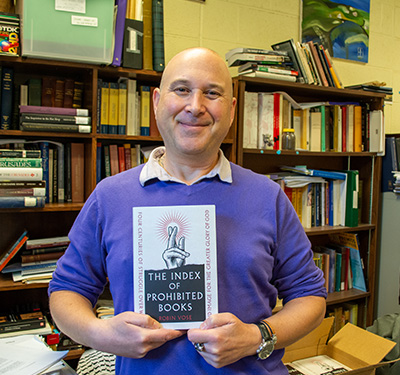
History professor Dr. Robin Vose has published his newest book, The Index of Prohibited Books: Four Centuries of Struggle over Word and Image for the Greater Glory of God. The book is the first comprehensive history of the Catholic Church’s notorious Index, and explores ongoing debates over banned books, censorship, and free speech.
“As this book makes clear, censorship has always been a ‘university’ subject. It’s a complicated history, but an important one for us to reflect on right now, to put our current struggles over campus free speech, academic freedom, and ‘cancel culture’ into better historical perspective,” Vose said.
Vose said part of the inspiration for The Index of Prohibited Books: Four Centuries of Struggle over Word and Image for the Greater Glory of God came from a class on the history of persecutions he was teaching in 2020.
“Students provided feedback on early chapters of this research into inquisitorial censorship, and several ended up writing their own final research essays on related topics. It was a great experience and really helped me try and write for a student audience—not just for ‘experts.’”
Vose said STU students’ exposure to a broad range of disciplines within the liberal arts has helped him broaden his own knowledge in fields like literature.
“They often come to class with more knowledge than I do about certain types of literature. They recognize books they have studied in Philosophy, Religious Studies, Science, and even Psychology, Economics, and Criminology classes when we look at what was banned, and they help me to understand why these matter. I’ve learned a lot from Native Studies students and faculty too, since the banning of Indigenous cultural productions is a subject I grapple with in one of the chapters,” he said.
“I literally could not have written this book if I was not teaching at a place like St. Thomas.”
Vose’s interest in inquisitorial book banning stretches back to his own grad school days. He was working at the Notre Dame Rare Books library when it acquired the world’s largest remaining private collection of inquisition documents.
“I was well placed to do this sort of research when the Vatican finally decided to open up its previously-secret inquisition archives in 1999. It’s a fascinating new field, full of exciting discoveries that are now allowing us to rewrite what we thought we knew about the history of the Church’s long history of book-banning.”
While generations before have wrestled with the issue of censorship, Vose said he hopes his book can contribute to the conversation today in the face of evolving technology, ideological conflict and corporate and government concentrations of power.
“Ideas matter, but they can also be dangerous—and that tension is precisely what a liberal arts education best equips us to study.”
-(2).jpg)
/filters:format(webp)/prod01/stuca/media/stu/site-assets/images/features/STUBSA.jpg)
/filters:format(webp)/prod01/stuca/media/stu/site-assets/images/features/Accessibility-Week-News-Box.jpg)
/filters:format(webp)/prod01/stuca/media/stu/site-assets/images/features/Arts-Matters-News-Box.png)